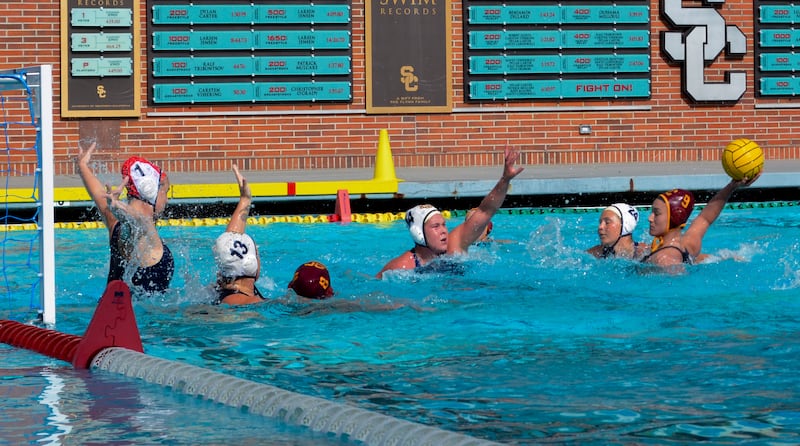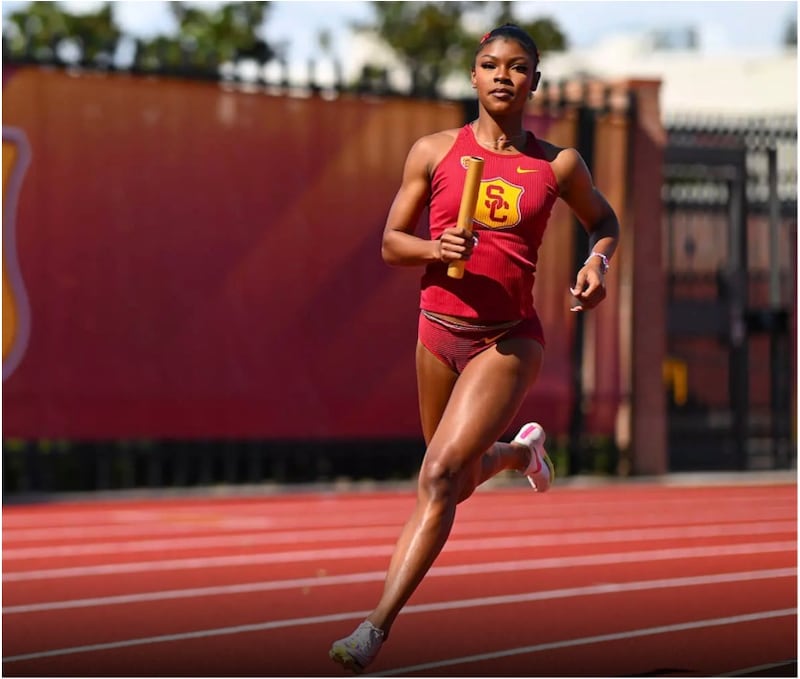USC is an Olympian factory. If it were a country, it would rank 13th in all-time summer Olympic medals, according to USC News. Trojan athletes are exactly where they need to be for LA28 — at the university that has produced more Olympians than any other and the university that will soon host the competition.
However, who among USC’s current student-athletes will join the Olympic legacy? Unless they’ve qualified before, predicting who will leap to the world stage is far from exact, and the odds are slim.
Only 120 track and field athletes and 52 swimmers earned roster spots for Team USA in Paris. Medium estimated the chances of an NCAA track athlete making the Olympics at roughly 1 in 500.
“The exceptional college athlete wants to win,” said USC associate journalism professor Alan Abrahamson. “The Olympic athlete hates to lose, and they’re ruthless about not losing.”
Track and field hopefuls must finish in the top three in the U.S. Trials, and swimmers must finish in the top two. For team sports like water polo or soccer, athletes must already be embedded in the national pipeline and have proven that they can perform consistently against international competition.
Unlike professional athletes in leagues like the NFL or NBA, Olympians can struggle to make a stable income.
“It’s very difficult to make a living as an Olympic athlete, so they’re doing it for the love of the sport,” Abrahamson said.
In pools, on tracks, and across fields at USC, these nine Trojan athletes are on track to etch their names alongside the greats who came before.
Tilly Kearns, Redshirt Senior, Water Polo — Australia
A 2024 Olympic silver medalist for Australia, Tilly Kearns is a two-time Olympian and two-time All-American who is poised to reassert her dominance in the collegiate pool this year. As a redshirt Senior, she ranks No. 16 all-time in career scoring at USC with 162 goals. Kearns is the type of player who defines an entire generation of excellence for an Olympic team. She’s already a world-class player and locked for her third Olympics in 2028.
Mia Brahe-Pedersen, Freshman, Track and Field (100m, 200m) — United States
Mia Brahe-Pedersen is one of the most electrifying blurs in American Track & Field. She entered USC as one of the fastest high school sprinters in history. Brahe-Pedersen, of Lake Oswego, Oregon, ran 11.00 in the 100m and 22.43 in the 200m, which ranked her fourth and third all-time, respectively, according to MileSplit.com.
Her blend of top-end speed and clean mechanics makes her a strong contender for the 2028 Games, particularly in the 4x100 relay. To qualify individually, she must likely run sub-11.05 in the 100 or sub-22.50 in the 200 and finish in the top three at the U.S. Trials.
With three years to develop at USC under two-time Olympic Gold medalist and World Champion coach Quincy Watts, Brahe-Pedersen is one to keep an eye on.
Minna Abraham, Junior, Swimming (200m freestyle, 4x200m freestyle relay) — Hungary
Abraham is a standout Junior from Budapest who already represented Hungary at the 2024 Olympics, reaching the 200m freestyle semifinal and helping relay teams to top-10 finishes. At USC, she has been a 5-time CSCAA All-American, Pac-12 Women’s Freshman Swimmer of the Year, and set the USC school record in the 200y freestyle (1:41.38). Her chances of making the 2028 Olympics are high. Already on Hungary’s national team, with international experience and rising NCAA-level times, she is well-poised to qualify for her country again in 2028.
Ezra Frech, Sophomore, Track and Field (High Jump, 100m) — United States

A world-record holder in the T63 high jump, a two-time Paralympian, and already the owner of two Paralympic gold medals from Paris 2024, he’s stacked with hardware most athletes only dream of. He sprinted to gold in the T63 100m and soared to the top of the podium in high jump, adding to a collection that already includes multiple World Championship medals. And here’s the kicker: he’ll only be 23 years old when the Games come to Los Angeles in 2028. With the home crowd behind him, Frech isn’t just a contender — he’s shaping up to be one of the defining stories of the Paralympics.
Ashley Erasmus, Sophomore, Track and Field (Shot Put) — South Africa
If the ground shakes around Allyson Felix field, it’s probably because South African Olympian Emily Erasmus just chucked a shot put 18 meters. Erasmus’ thunderous throws earned her Gold in the 2024 African Athletics Championships shot put event, and a spot in Paris later that year. In her freshman year, she shattered the USC shot put record with a 17.99-meter throw, and broke her own record with an 18.17-meter throw later in the year.
She’ll finish her career at USC right in time to roll into the 2028 competition.
Emily Ausmus, Sophomore, Water Polo — United States

Emily Ausmus was the youngest member of Team USA’s gold-medal roster in Paris 2024, scoring three goals as an attacker. To reach Los Angeles, she must maintain her place in the rotation and continue contributing in international tournaments. In the pool with fellow Olympian Kearns, Ausmus is a rising star.
Krzysztof Chmielewski, Junior, Swimming (200m butterfly) — Poland
Krzysztof Chmielewski reached the finals at Paris 2024, placing fourth in the 200 butterfly with a time of 1:53.90. A World and European medalist, he is already among the sport’s elite. Representing Poland, his path to Los Angeles is straightforward: maintain international form, swim under 1:53 and secure top finishes at national and European qualifiers. At just 24 in 2028, he will be entering his prime.
Michał Chmielewski, Junior, Swimming (200m butterfly) — Poland
The twin brother of Krzysztof, Michał, also represented Poland in Paris, clocking 1:54.64 in the semifinals. He has earned European medals and continues to progress under USC coaching. To make the 2028 Games, he must push below 1:54 in the 200 fly and remain a fixture on Poland’s national team.
Jassani Carter, Junior, Track and Field (200m/100m) — United States

Jassani Carter has emerged as a consistent All-American for USC, recording times of 11.04 in the 100 and 22.46 in the 200. Carter’s most realistic path is through the 200m or as a relay pool member. She must hit the Olympic entry standard — roughly 22.57 — and place in the top three at the U.S. Trials.
Ultimately, an Olympic hopeful is more than just a standout in college competition. They are athletes whose marks, medals or upward trajectory put them within striking distance of the 2028 Los Angeles Games.
